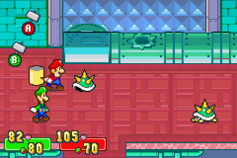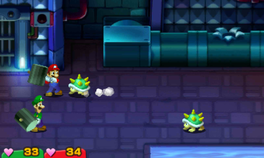Counterattack: Difference between revisions
(extra paragraphs to explain some of the logistics, including bumping per game data into independent paragraphs) |
Power Flotzo (talk | contribs) No edit summary |
||
| (One intermediate revision by one other user not shown) | |||
| Line 28: | Line 28: | ||
In ''[[Mario & Luigi: Paper Jam]]'', ''[[Mario & Luigi: Superstar Saga + Bowser's Minions]]'', and ''Mario & Luigi: Bowser's Inside Story + Bowser Jr.'s Journey'', the [[Guard|Emergency Block / Guard]] was incorporated, making it a lesser but easier alternative to counterattacks. | In ''[[Mario & Luigi: Paper Jam]]'', ''[[Mario & Luigi: Superstar Saga + Bowser's Minions]]'', and ''Mario & Luigi: Bowser's Inside Story + Bowser Jr.'s Journey'', the [[Guard|Emergency Block / Guard]] was incorporated, making it a lesser but easier alternative to counterattacks. | ||
In some games, the player can win certain battles only by counterattacking, those battles being [[Shrowser]]'s battle in ''[[Mario & Luigi: Partners in Time]]'', [[Thunder Sass]]'s battle in ''Mario & Luigi: Dream Team'', and [[ | In some games, the player can win certain battles only by counterattacking, those battles being [[Shrowser]]'s battle in ''[[Mario & Luigi: Partners in Time]]'', [[Thunder Sass]]'s battle in ''Mario & Luigi: Dream Team'', and [[Ludwig]]'s battle in ''Mario & Luigi: Superstar Saga + Bowser's Minions''. In ''Mario & Luigi: Paper Jam'', a group of [[Hammer Bro]]s. takes away Mario, Luigi, and Paper Mario's [[Command Block]]s once they capture and imprison them in [[Twinsy Tropics Dungeon]]. Before they acquire any blocks that allow them to directly attack, the trio must defeat the first few Hammer Bros. by using counterattacks. | ||
If Mario or Luigi is [[downed|down]], the remaining brother will carry him on his shoulders on the enemy's turn. While doing so, it takes longer for them to start a jump or ready their hammer, which in turn makes dodging and countering more difficult. This does not apply if the enemy uses an attack where Mario or Luigi run away from them, in which case the other brother is left behind during the chase. Some games have slightly different rules regarding this. | If Mario or Luigi is [[downed|down]], the remaining brother will carry him on his shoulders on the enemy's turn. While doing so, it takes longer for them to start a jump or ready their hammer, which in turn makes dodging and countering more difficult. This does not apply if the enemy uses an attack where Mario or Luigi run away from them, in which case the other brother is left behind during the chase. Some games have slightly different rules regarding this. | ||
| Line 57: | Line 57: | ||
[[Category:Mario & Luigi: Partners in Time moves]] | [[Category:Mario & Luigi: Partners in Time moves]] | ||
[[Category:Mario & Luigi: Superstar Saga moves]] | [[Category:Mario & Luigi: Superstar Saga moves]] | ||
[[it:Contrattacco]] | |||
Latest revision as of 14:48, November 22, 2024
Counterattacks are a type of attack present in the Mario & Luigi series. When enemies attack on their turn, the player is allowed to take action, dodging or countering their attacks. A counterattack enables the character to deal additional damage even though it is not their turn. The counterattack's power is often the same as a failed attack on the player's turn, though some can deal massive amounts of damage, or the damage is relative to the enemy's attack power.
Performing counterattacks can be difficult, as enemies have varying attack patterns with certain mix ups. They might only attack one character, or attack both at the same time, or pretend to attack one character but instead attack the other. An attack might come out too fast to rely on reaction alone to dodge or counter. However, every enemy's animations involve one or more tells, a distinct portion which is tied to a specific variation of that attack. By remembering and recognizing tells, it becomes easier to determine which variation of an attack is being used, and therefore easier to counterattack.
Mario and Luigi counterattack enemies by using their hammers and jumping ability. Jumping works as usual, with the player jumping directly upward and potentially landing on a target. The hammer has a unique control scheme where it first has to be readied by holding the button. Releasing the button with a fully readied hammer swings forward; releasing while the hammer is not in position only has the character put it away. In Mario & Luigi: Superstar Saga, Mario & Luigi: Partners in Time and Mario & Luigi: Bowser's Inside Story, the hammer cannot be held indefinitely. If the player holds for too long, the hammerhead will fall off. Starting from Mario & Luigi: Dream Team, this punishment was removed. The change applies to the remakes of the aforementioned games, Mario & Luigi: Superstar Saga + Bowser's Minions and Mario & Luigi: Bowser's Inside Story + Bowser Jr.'s Journey. The player does not choose between countering with a jump attack or a hammer attack; this is predetermined by the attack of the enemy.
Some enemies and bosses have attacks which are countered in unique ways. Some of these still involve the base concepts of jumps and hammers, just used in alternate ways. One common occurrence in Mario & Luigi: Dream Team is enemies chasing after Mario and Luigi, where both brothers have to jump over the enemy's attacks. Some attacks in this state cause the target to fall over, so they stop being involved in the attack. Others involve wholly distinct actions, which have their own control schemes. An example of this would be Kamek's second battle in Mario & Luigi: Dream Team. One phase has him summon many Dry Bones. When their attack is countered by jumping on them, Mario then gets to throw the Dry Bones at Kamek by aiming with a cursor. Some enemies have unique responses to successfully countering an attack.
If the player has a character's attack power increased, it also boosts their counterattack's power. If the characters are under the effects of a Boo Biscuit, counterattacks deal no damage.
In Mario & Luigi: Partners in Time, Baby Mario and Baby Luigi participate in battles and have identical mechanics. In Mario & Luigi: Paper Jam, Paper Mario participates in battles and has slightly different mechanics. He can flutter while jumping, and his copies swing their hammers one after the other.
In Mario & Luigi: Bowser's Inside Story and Mario & Luigi: Bowser's Inside Story + Bowser Jr.'s Journey, Bowser's counterattack moves are punching and ducking in his shell. Unlike other characters, the player chooses which move to use against an enemy's attack. Some attacks call for using both moves in specific orders.
In Mario & Luigi: Dream Team, while Mario is in the Dream World, many counterattacks allow Mario to use the Circle Pad. When jumping, Mario can walk up and down to find the optimal position. When swinging the hammer, Mario can aim in any of the four cardinal directions. Enemies or attacks can come from any of those directions.
Counterattacks also appear in the giant battles of Mario & Luigi: Bowser's Inside Story and Mario & Luigi: Dream Team. Super Bowser or Giant Luigi use the Touch Screen to use their respective abilities to counterattack. Giant Luigi may have to jump and duck to evade attacks, or use his hammer to deflect or crush projectiles, among other more unique counterattacks.
In Mario & Luigi: Paper Jam, Mario & Luigi: Superstar Saga + Bowser's Minions, and Mario & Luigi: Bowser's Inside Story + Bowser Jr.'s Journey, the Emergency Block / Guard was incorporated, making it a lesser but easier alternative to counterattacks.
In some games, the player can win certain battles only by counterattacking, those battles being Shrowser's battle in Mario & Luigi: Partners in Time, Thunder Sass's battle in Mario & Luigi: Dream Team, and Ludwig's battle in Mario & Luigi: Superstar Saga + Bowser's Minions. In Mario & Luigi: Paper Jam, a group of Hammer Bros. takes away Mario, Luigi, and Paper Mario's Command Blocks once they capture and imprison them in Twinsy Tropics Dungeon. Before they acquire any blocks that allow them to directly attack, the trio must defeat the first few Hammer Bros. by using counterattacks.
If Mario or Luigi is down, the remaining brother will carry him on his shoulders on the enemy's turn. While doing so, it takes longer for them to start a jump or ready their hammer, which in turn makes dodging and countering more difficult. This does not apply if the enemy uses an attack where Mario or Luigi run away from them, in which case the other brother is left behind during the chase. Some games have slightly different rules regarding this.
Names in other languages[edit]
| Language | Name | Meaning | Notes |
|---|---|---|---|
| French | Actions de Défense[1] | Defensive actions | |
| German | Konter[?] | Counter | |
| Italian | Contrattacco[?] | Counterattack |

